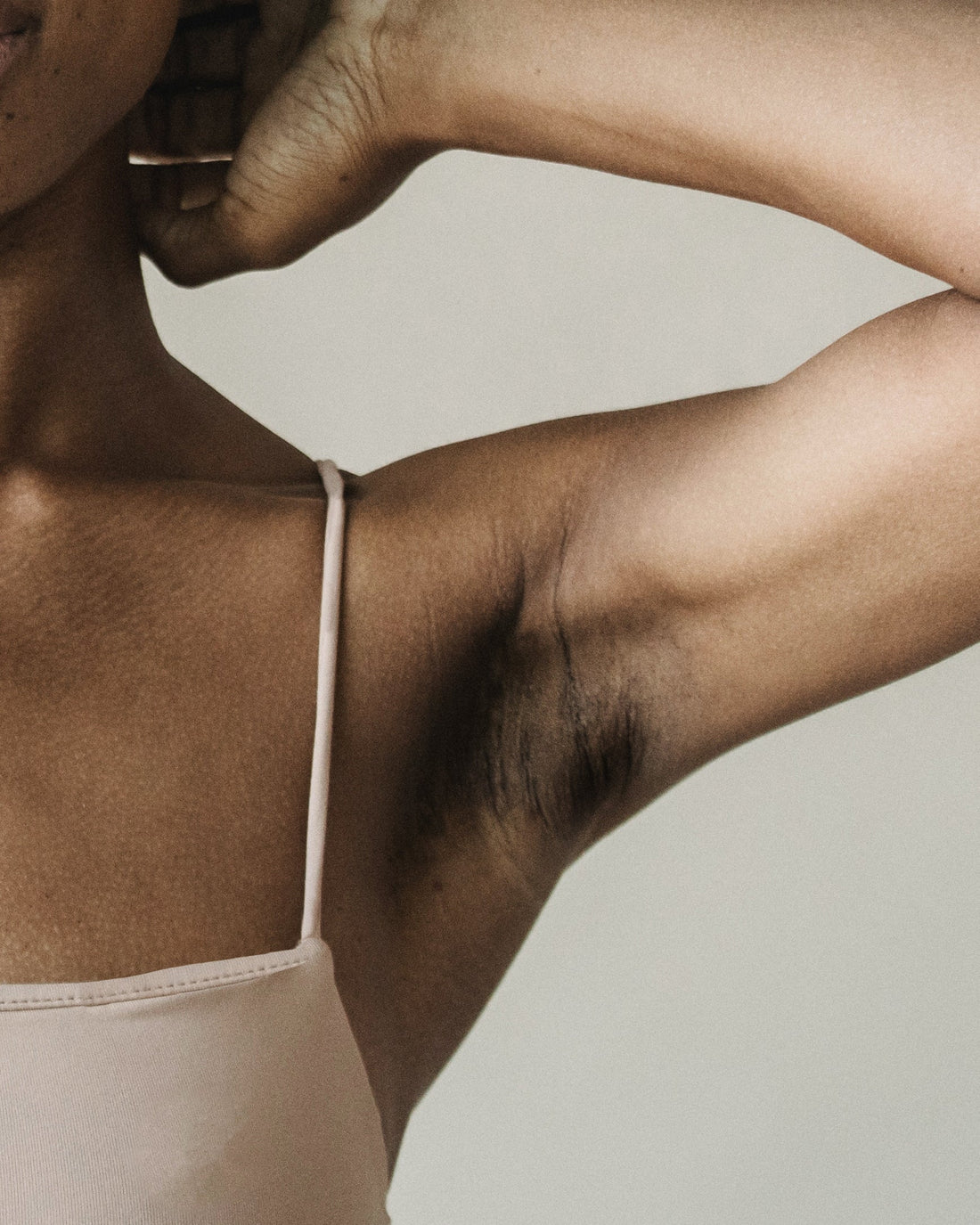
Perimenopause Pigmentation: Why Underarm Darkness Can Worsen During This Transition
OVERVIEW
- Perimenopause causes various hormonal changes that can lead to increased pigmentation in sensitive areas like your underarms.
- The products that used to work for your body no longer do because your skin is responding differently at a cellular level.
- To combat this, ditch the irritating products. Instead of a highly-fragranced body wash with synthetic ingredients, use a brightening kojic acid soap bar in the shower daily.
- Antiperspirants are the main culprit when it comes to underarm darkness - opt for a natural deodorant that has gentle, brightening actives instead.
I've noticed something fascinating in my years of researching underarm pigmentation - so many women come to me totally confused about why their underarms suddenly darkened during perimenopause! This connection is rarely discussed (like so many menopausal changes, unfortunately), but understanding it is absolutely key to finding solutions that actually work.
WHY DOES THE BODY CHANGE SO MUCH DURING PERIMENOPAUSE?
Let's talk about what's really happening during perimenopause. Your body goes through dramatic hormone shifts (especially that drop in estrogen). This creates a cascade of skin changes, with underarm darkening being one of the MOST frustrating!
Let’s break down what’s really happening beneath the surface:
INCREASED MELANIN SENSITIVITY
Your skin becomes SO much more sensitive during perimenopause - reacting more intensely to minor irritations than it ever did before! That tiny bit of friction from shaving or that deodorant you've used forever can suddenly trigger way more melanin production.
I can't tell you how many women tell me, "But I haven't changed anything in my routine!" That's exactly the point - you haven't changed, but your hormones sure have! Your skin is responding completely differently now to the exact same triggers.
CHANGES IN SKIN STRUCTURE
Here's something nobody warns you about - when estrogen drops during perimenopause, your skin gets thinner and more fragile. With less collagen and elastin to provide that youthful bounce-back, your skin becomes WAY more vulnerable to everyday friction.
Think about it - you've been moving your arms the same way for decades, but now that movement creates micro-irritation that never happened before. Your poor underarms are basically experiencing tiny friction injuries all day long, which leads to that frustrating darkening that seems to come out of nowhere!
ALTERED SWEAT COMPOSITION
Those lovely hot flashes and night sweats aren't just making you uncomfortable - they're actually contributing to underarm darkening too! During perimenopause, even your sweat chemistry changes - usually becoming more acidic.
This new sweat composition interacts differently with the bacteria on your skin AND with your deodorant ingredients. The result is more irritation and more pigmentation. It's like your body decided to add insult to injury during an already challenging transition!
WHY TRADITIONAL SOLUTIONS OFTEN FAIL
If you feel like you’ve tried everything but NOTHING seems to work, there's a good reason for this - your skin is literally responding differently at a cellular level now. Those brightening products that worked like magic in your 20s and early 30s? They're fighting an uphill battle against your new hormonal reality.
IT STARTS IN THE SHOWER
During perimenopause, your body goes through many unexpected changes like increased odor and discoloration. I highly recommend tackling BOTH issues in the shower. Since it’s part of our daily routines, it’ll be much easier to maintain a consistent brightening routine that also eliminates odor at the same time.
There are plenty of brightening shower products out there, but not all of them work the same! Look for gentle brightening ingredients like Kojic Acid, or Licorice Root Extract if you have super sensitive skin (it has the added benefit of calming inflammation). I love both these ingredients because they slow down melanin production without being too harsh on the skin.
I developed a Kojic Acid Bar with these specific ingredients after hearing from SO many menopausal women struggling with both issues. No matter what you choose to buy make sure that the bar is made with Kojic Acid Dipalmitate (this is the type that doesn’t oxidize and stays fresh longer!).
DITCH THE ANTI-PERSPIRANT
Time to break up with your old antiperspirant! Those aluminum-based products are NOT your friends during perimenopause when your skin barrier isn't what it used to be.
Consider switching to a natural deodorant once and for all to eliminate any chance of irritation that can lead to future hyperpigmentation. I would also go the extra mile by looking for natural deodorants that contain gentle brightening ingredients like Niacinamide and Alpha Arbutin.
These brilliant ingredients help regulate melanin production while actually calming inflammation rather than causing it. I formulated a brightening deodorant after realizing there was a gap in the market for something that was gentle AND effective. But whatever product you choose, just make sure it’s aluminum-free and gentle on the skin.
THE BOTTOM LINE
If you've noticed your underarms getting darker during perimenopause - you are definitely NOT alone! This is a super common response to the hormonal rollercoaster ride your body is on. The old brightening tricks that worked in your younger years probably won't cut it anymore.
But here's the good news - you absolutely can improve underarm darkening. Your skin has different needs now, and once you address those specific needs, you'll start seeing results.




